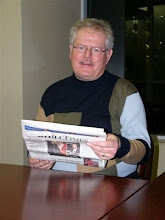Well so much for all those predictions that the Tories would be running on their economic record while the Opposition would be hammering away at the Harper government’s record on ethics.
The first weekend of the 2011 election has wrapped up and the word, coalition, is on everyone’s lips.
Stephen Harper may be the first Prime Minister in Canadian history whose government has been found in contempt of Parliament. He may be the guy who came into office on the ethics ticket only to be branded as ethically challenged by the Opposition.
But without doubt he is a master at manipulating the public agenda and the media.
Within 24 hours of losing a confidence vote in the House of Commons, Harper managed to put his accusers on the defensive over a hypothetical possibility that should the Tories not gain a majority, the three Opposition parties will gang up and form an evil coalition to take control of Parliament and void the will of the people.
As proof, he cited the ill-fated 2008 coalition by the Opposition to seek the Governor General’s permission to form a coalition government after the 2008 election.
Harper claims the Liberals and NDP plan to take control of the country with the separatist Bloc Quebecois as a partner.
Actually the proposed coalition only consisted of the Liberals and New Democrats. The Bloc only agreed not to vote against the coalition for two years. But what is the truth in politics when you have a convincing narrative.
The feat is all the more remarkable when you consider that Harper himself tried to hatch such a coalition after the 2004 election in a letter with NDP Leader Jack Layton and Bloc Quebecois Leader Gilles Duceppe.
The Prime Minister has been called everything from a hypocrite to a liar (by Duceppe). But still his narrative seems to be sticking with most of the voting public as the truth so far.
To borrow a term that came out of the 2004
The allegations by the swift boat veterans, who were Republicans, turned out to be BS. But it didn’t matter. During the election campaign they framed Kerry as a fraud.
The swift boat episode is a classic case study in the process of issue framing in politics. Whoever can set the ``frame’’ around political issues usually can control the narrative of an election campaign and put the opponent on the defensive.
The Liberals of course didn’t help themselves by being vulnerable when the election began on Saturday. They should have moved before Parliament was dissolved last Friday to rule out participation in a coalition. That would have been getting in front of the story.
Instead, Ignatieff stumbled when the question was to put to him at first and then issued a press release a day later to deny any intention of forming a coalition. Score one for Harper.
The Liberals could have released ads featuring Harper’s 2004 coalition letter. That way they could have planted the idea in voters’ minds that Harper is a hypocrite who will stop at nothing to gain power. Harper of course denies he had any intention of coalition in 2004.
Now Harper has been able to frame or define Ignatieff as a usurper of democracy. Harper has also been able to demonize coalitions when they are in fact a legitimate part of parliamentary democracy.
Remember, this country was founded because Sir John A. Macdonald was able to form a coalition with Sir George Étienne Cartier in support of Confederation.
So far this election campaign has been looking a lot like Bambi versus Godzilla.
What’s interesting is why Harper is not running on his government’s record on the economy, or anything else. Why the fear frame, particularly when Harper has such a commanding lead in the polls?
Perhaps it is because Harper knows Canadians are still uneasy about him regardless of what they might think of Ignatieff. And the only way the Tories can win a majority is by stampeding a fearful electorate, or so he seems to think.
But Harper’s framing tactic could back fire yet. His former chief of staff, Tom Flanagan, has come forward to say, yes, his old boss was looking at possibly forming a coalition with the NDP and the Bloc to take control in 2004.
Score one for Bambi.



